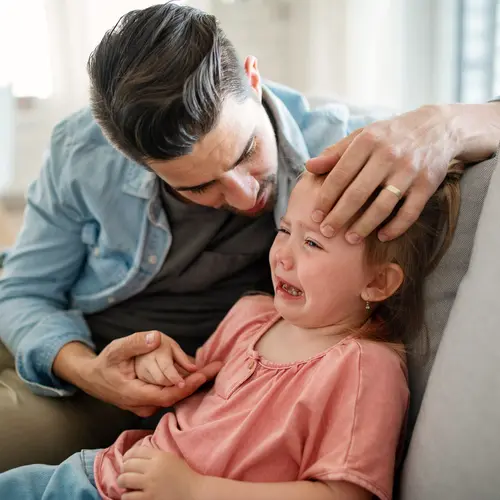You know the feeling: hot cheeks, wishing you could disappear. You'd do anything to spare your child that sense of embarrassment.
But those feelings happen, and they're normal.
"Starting around 4 or 5 the world gets bigger for children, and so does their awareness of it, meaning they become aware of dirty looks, teasing, being pointed at, and being different," says psychologist Lawrence J. Cohen, PhD, author of Positive Parenting. "Partly that's developmental, and partly it's because of school -- they have so much more peer interaction."
Around this age, kids also start to develop an inner conscience. "When kids are younger their conscience is similar to that of a dog: It's external. Are you going to be praised or get in trouble? During the school years it's becoming internal and children become aware if they do something that violates their own sense of order," Cohen says.
Don't make light of it, says child development expert Betsy Brown Braun, author of Just Tell Me What to Say: Sensible Tips and Scripts for Perplexed Parents.
"It's really the parent's job to empathize and understand," Braun says. "Don't make it bigger than your child is making it, but don't blow it off. If your child says, 'Today I bent over and my pants ripped,' say, "Oh my gosh, that must have been hard.' Ask how she handled it and try to get her talking about it."
If your child says she can't go back to school because everyone will laugh at her, tell her you understand why she feels that way. "You can say, 'Not going back to school is not a workable solution, but I can understand that it feels like the only possible way. We'll have to work together to find a solution'," Cohen says.
A great way to show you understand is to tell your own embarrassing story. Emphasize how difficult it was (not how terrible it was). Admitting how poorly you handled it can help, Braun say, because "it helps your child understand she's not alone."
Braun and Cohen share more tips to help your child get past six common, embarrassing situations.
1. Passing Gas in Public
Farting, sneezing and spraying boogers, throwing up, or even peeing in class are common scenarios for grade-school kids. "The most painful embarrassing moments are ones over which you have no control," Braun says. "These fall under the category of 'couldn't help it.'"
She suggests reminding your kids that everyone farts. "Another thing I tell kids is, 'You know, the reason people laugh or react when something embarrassing happens is because they are relieved that it happened to you, not them.'"
Help your child acknowledge the situation, laugh it off, and move on, says Braun. Tell her to say something along the lines of, "Beans for dinner last night. Sorry." If kids are still teasing, say, "Oh get over it," and try to distract them. Don't pretend it didn't happen.
2. Being Noticed While Nose-Picking
When classmates call your child out on this one, what they're really saying is, you're not following the rules.
The best thing to tell your child in this situation is to try a quick comeback, suggests Braun, like "Takes a gross person to notice something gross." Or just laugh it off with something like, "Couldn't wait for a tissue."
Avoiding embarrassment is how children learn social rules. "Children really vary by how intensely they feel embarrassment. It's best to be somewhat in the middle," Cohen says. "You wouldn't want your child to be unable to be embarrassed, but you don't want him to be crippled by it."
3. Bad Hair Day
Elementary school kids really, really want to fit in. "The desire to be different doesn't come out until later on," Braun says. If your child wakes up with funny hair, help her out by suggesting she shower before heading to school.
If her new haircut wasn't a big success, encourage her to be confident, admit that she's not crazy about it either, and that it's no big deal because hair grows back, Braun says.
4. Scoring for the Other Team
Your child throws the ball in the basket and is proud of making the shot, until he realizes that he scored for the wrong team.
He's feeling embarrassment mixed with guilt for letting down his teammates. Tell him that you understand why he's mad at himself, that it could happen to anybody, and that it's not useful to dwell on it, Brown suggests.
5. Debuting Braces
If your child says her classmates made fun of her braces, don't brush it off.
"It's so easy to say, 'You're beautiful. Don't listen to them.' Although you're trying to be loving and caring, you're inadvertently invalidating her feelings because she can't just ignore it," Cohen says.
"It's much more helpful to say, 'You know I think you're beautiful no matter what, but I know it's easy for kids to say you look different and feel it's bad."
Help her notice how her friends react, not just what the mean kids say. "Groups tend to be crueler and friends more supportive," Cohen says.
6. Crying in Front of Classmates
Bursting into tears at school is hard for kids because they don't want to be seen as the baby.
"This tends to get stronger for boys than for girls sometimes as early as 4 but usually by age 6 to 8," Cohen says. He recommends talking to your child about mixed feelings -- letting them know that it's OK to cry if you really need to, but sometimes you might be able to find another way to express your emotions.


